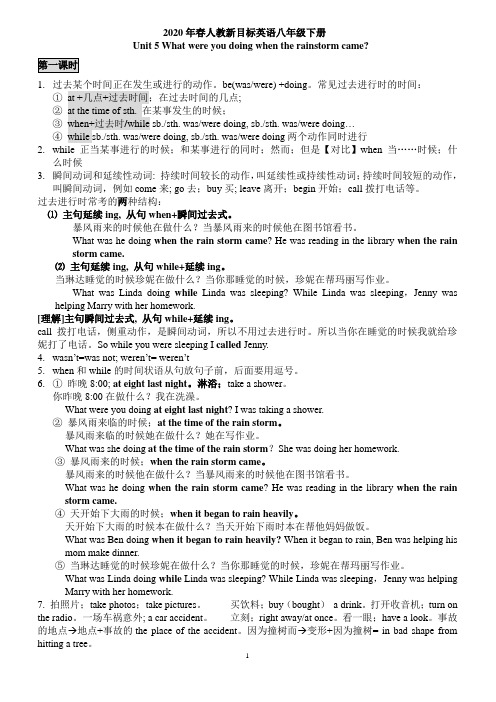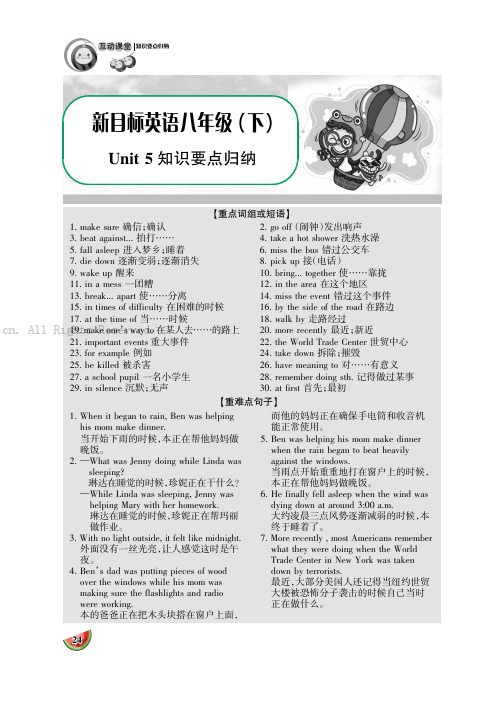(完整版)新版新目标英语八年级下册unit5知识点总结
英语人教版新目标八年级下册知识整理Unit5

【英语】八年级下册教材全梳理(Unit5 If you go to the party you’ll have a great time)知识·巧学生词巧解【词析】音析:字母组合ea读作[]。
义析:a kind of trousers【典句】This pair of jeans is in style.这条牛仔裤很时髦。
【拓展】jeans本身是复数名词,作主语时谓语动词要用复数形式。
take away拿走【词析】形析:take(拿)+away(离开)义析:take sth.from one place to another【典句】Don’t forget to take away your umbrella.别忘了带走你的雨伞。
【拓展】away是副词,当宾语为代词宾格时,一定要放在away的前面。
make a living 谋生【词析】形析:make(做)+a(一种)+living(生活)义析:do sth.for a living【典句】He makes a living as a writer.他靠写作维持生计。
【拓展】使用时,如果说明谋生的手段应在living后加介词by+doing的结构,指“以……为生”。
如:He makes a living by selling books.他以卖书为生。
【词析】音析:a读[],ai读作[e],重音在第二个音节上。
形析:again(又;再次)+st义析:in a direction or course opposite to【典句】We boated against the wind.我们逆风行船。
【拓展】against本身是介词,不能单独作谓语,常和系动词be连用,意为“反对”。
【词析】音析:ch读作[],an读作[],词尾的e不发音。
形析:形近词change(选择)义析:something that happen unusually and luckily【典句】I haven’t had a chance to read my letter.我还没有机会看我的信呢。
新目标英语八年级下册5单元笔记

Unit 5 If you go to the party,you’ll have a great time!条件句2. 现在进行时表示将来的时间一. if条件句1. if2. 用法:(1)条件状语从句通常由连词if引导,意为“如果、假如”,主句不能用be going to表示将来,而应该用shall,will。
(2)if “如果”,引导条件状语从句,if从句则用一般现在时,主句用一般将来时。
注意宾语从句中的if与条件状语从句if的区别。
宾语从句中的if“是否”相当于 whether,引导宾语从句,时态需根据语境确定。
I don't know if it will rain tomorrow. 我不知道明天是否会下雨。
二. 现在进行时表示将来的时间1. 用be doing表示将来:主要意义是表示按计划、安排即将发生的动作,常用于位置转移的动词,如:go,come,leave,arrive等,也可用于其他动作动词。
这种用法通常带有表示将来的时间状语,如果不带时间状语,则根据上下文可表示最近即将发生的动作。
2. 现在进行时表示将来和用be going to 表示将来意思比较接近,但是现在进行时更强调事先已安排好,即将去做的事情, 而be going to 一般只表示打算做某事,有做某事的意图。
much tootoo much 后接不可数名词,用来表示数量太多,意思是“……太多了(数量多)”;much too后接形容词,用来说明程度的,意思是“太……(程度深)”2. be famous for 和 be famous asbe famous for表示“因……而出名”, for后接表示出名的原因;be famous as则表示“以……身份而著名”,as 后接职业、身份或地位,表示作为……职业、身份或地位是著名的3 travel around the world 周游世界4. reasons for becoming a professional athlete 赞同成为一名职业运动员的理由for prep. (表示赞成、支持),其反义词为againstreasons against becoming a professional athlete 反对成为一名职业运动员的理由。
八年级下册英语第五单元知识点

八年级下册英语第五单元知识点
摘要:
1.条件状语从句
2.half与half of的用法
3.重要短语和句型
正文:
八年级下册英语第五单元主要涉及了以下几个知识点:
1.条件状语从句:if引导的条件状语从句表示“如果”。
构成形式为主句一般将来时时态,if从句一般现在时态,或if从句一般现在时态,主句一般将来时态。
用法:表示假设或条件。
2.half与half of的用法:half为形容词,表示“一半的,半个的”。
half of代词/the名词,表示“一半”。
3.重要短语和句型:
- arrive at/in:到达(小地方用arrive at,大地方用arrive in)
- reach:到达
- get to:到达
- on foot:步行
- at the school gate:在学校大门口
- on weekdays:在平日,工作日
- on weekends:在周末
以下是一个关于这些知识点的实用例子:
假设你是一名学生,有一天你告诉你的朋友:“如果明天不下雨,我们就去公园玩耍。
”这句话中就用到了条件状语从句。
另外,如果你说:“我有一半的作业已经完成了。
”这就是使用了half这个形容词。
而在描述到达某个地方的方式时,你可以用arrive at(如:我昨天到达北京),或reach(如:我昨天到达北京),也可以说get to(如:我昨天到达北京)。
学习这些知识点有助于提高你的英语水平,更好地应对日常学习和生活中的各种场景。
八年级英语下册 Unit 5 If you go to the party知识点分析 人教新目标版

Unit 5 If you go to the party, you’ll have a great time!重点词汇:jeans n. 牛仔裤 charity n. 慈善团体;慈善事业chance n. 机会;机遇 injured adj. 受伤的;受损害的sincerely adv. 真诚地 lawyer n. 律师tonight n. 今晚 organize v. 组织clean-up 清除;打扫 flower n. 花agent n. 代理人;代理商 professional adj. 专业的,职业的against prep. 反对重点词汇:1. take away 拿走, 运走,取走2. all the time 一直3. make a living 谋生4. mobile phone 移动电话5. dining room 餐厅;食堂6. in order to为了……7. have a great time 玩得高兴8. have a party 举行聚会9. go to college 上大学10. be famous for 因……而著称11. make money 挣钱12. in fact 事实上13. laugh at 嘲笑14. too much 太多15. get exercise 锻炼16. travel around the world 周游世界17. work hard 努力工作18. wear jeans 穿牛仔裤19. let in 允许……进入,嵌入20. get an education 获得教育21. stay at home 呆在家22. help sb. (to)do sth... 帮助某人做某事23. at the party 在晚会上24. be/become famous 变的有名25. a professional soccer player 一名职业足球运动员26. seem like 看起来像27. give money to 捐钱28. spend time 消磨时间29. get injured 受伤日常用语:1. I think I’m going to the dance with Karen and Ann.2. If you do, you’ll have a great time.3. Are you going to the party? Yes, I am. I’m going to wear my new jeans.4. If you do, you will be late.5. What will happen if they have the party tomorrow?6. If I don’t clean my room, my mother won’t let me meet my friends.7. I am going to the school party.8. You should wear your cool pants.精讲巧练:1.If you go to the party, you will have a great time.如果你这次去聚会,你就会玩得很高兴。
新目标英语八年级下Unit5知识点总结(打印版)

重点短语1.at the time of the rainstorm 在暴风雨来临的时候2.wait for the bus等公共汽车wait for someone walk by 等着人走过3.so far 到目前为止4.hear the heavy rain against my bedroom window听见大雨敲打着我卧室的窗户。
5.get wet all over me 我浑身淋湿了6.many people were caught in the rain yesterday.昨天许多人淋雨了。
7.make +名词+形容词make the sky very dark 使天空非常黑暗8.put pieces of wood over the windows 把木块放在窗子上9.put some candles and matches on the table把蜡烛和火柴放在桌子上10.m ake sure 确保,保证;查明,弄清楚make sure of 确信,对……有把握11.b eat heavily against the windows 猛烈地敲打着窗户beat sb / a team/ class 打败某人或某队win a match / game/ contest/ competition 赢得比赛或竞赛12.f all (fast) asleep = be asleep 快速入睡;进入梦乡fall-fell-fallen13.d ie down 逐渐消失,逐渐变弱put down 放下take down拆除,往下曳,记录turn down调小sit down坐下fall down倒下14.w ake up 醒来wake sb up 把某人叫醒wake-woke-woken15.i n a mess 脏成一团16.f eel like 给……感觉,感受到+名词;想要+doing sth17.b egin with 从……开始to begin with一开始,首先at the beginning of 在……的开头----at the endofbegin to do sth / begin doing sth =start to do /doing18.l eave (left) for sp 动身前往某地leave sp for sp 离开某地到某地leave +名词+介词短语把某东西留在某地leave sb by oneself把某人独自留下19.t ake the car to the car wash把车送到洗车处20.i n times of 在……的时刻in times of difficulty在困难时刻21.t urn on / off 打开/关掉turn it / them on (off)turn up /down把音量调大/调小turn it/them up(down)22.m ake one’s way to…艰难地问前往某地on one’s way home 在回家的路上;onone’s way to school23.t he basketball competition (compete)校篮球赛24.b y the side of the road 在路边25.b e helpful for sb to do sth 对某人来说干什么是有帮助的。
2020年春人教新目标英语八年级下册Unit-5 第1-2课时知识点

2020年春人教新目标英语八年级下册Unit 5 What were you doing when the rainstorm came?1.过去某个时间正在发生或进行的动作。
be(was/were) +doing。
常见过去进行时的时间:①at +几点+过去时间;在过去时间的几点;②at the time of sth. 在某事发生的时候;③when+过去时/while sb./sth. was/were doing, sb./sth. was/were doing…④while sb./sth. was/were doing, sb./sth. was/were doing两个动作同时进行2.while 正当某事进行的时候;和某事进行的同时;然而;但是【对比】when 当……时候;什么时候3.瞬间动词和延续性动词: 持续时间较长的动作,叫延续性或持续性动词;持续时间较短的动作,叫瞬间动词,例如come来; go去;buy买; leave离开;begin开始;call拨打电话等。
过去进行时常考的两种结构:⑴主句延续ing, 从句when+瞬间过去式。
暴风雨来的时候他在做什么?当暴风雨来的时候他在图书馆看书。
What was he doing when the rain storm came? He was reading in the library when the rain storm came.⑵主句延续ing, 从句while+延续ing。
当琳达睡觉的时候珍妮在做什么?当你那睡觉的时候,珍妮在帮玛丽写作业。
What was Linda doing while Linda was sleeping? While Linda was sleeping,Jenny was helping Marry with her homework.[理解]主句瞬间过去式, 从句while+延续ing。
call拨打电话,侧重动作,是瞬间动词,所以不用过去进行时。
新目标英语八年级(下)Unit5知识要点归纳

新目标英语八年级(下)知识要点归纳互动课堂1.When it began to rain,Ben was helping his mom make dinner.当开始下雨的时候,本正在帮他妈妈做晚饭。
2.—What was Jenny doing while Linda was sleeping?琳达在睡觉的时候,珍妮正在干什么?—While Linda was sleeping,Jenny was helping Mary with her homework.琳达在睡觉的时候,珍妮正在帮玛丽做作业。
3.With no light outside,it felt like midnight.外面没有一丝光亮,让人感觉这时是午夜。
4.Ben ’s dad was putting pieces of wood over the windows while his mom was making sure the flashlights and radio were working.本的爸爸正在把木头块搭在窗户上面,而他的妈妈正在确保手电筒和收音机能正常使用。
5.Ben was helping his mom make dinner when the rain began to beat heavily against the windows.当雨点开始重重地打在窗户上的时候,本正在帮他妈妈做晚饭。
6.He finally fell asleep when the wind was dying down at around 3:00a.m.大约凌晨三点风势逐渐减弱的时候,本终于睡着了。
7.More recently ,most Americans remember what they were doing when the World Trade Center in New York was taken down by terrorists.最近,大部分美国人还记得当纽约世贸大楼被恐怖分子袭击的时候自己当时正在做什么。
新版新目标英语八年级下册unit5核心知识总结

新版新目标英语八年级下册unit5核心知
识总结
新版新目标英语八年级下册Unit 5核心知识总结
本文档总结了新版新目标英语八年级下册Unit 5的核心知识。
Unit 5主要涉及了"Great people"这个主题,通过研究该单元内容,学生将了解到一些伟大的人物及其成就。
本单元的重点词汇包括:
1. talented - 有才能的
2. creative - 创造性的
3. determined - 坚定的
4. hardworking - 努力工作的
5. visionary - 有远见的
6. influential - 有影响力的
7. courageous - 勇敢的
8. persistent - 坚持不懈的
学生将会研究到以下几位伟大的人物:
1. Thomas Edison - 美国发明家,发明了许多重要的电气设备,如电灯和电话。
2. Helen Keller - 美国作家和演说家,她是一位聋哑人士,但她克服了困难,取得了巨大的成功。
3. Marie Curie - 波兰物理学家和化学家,她是第一个获得两次诺贝尔奖的女性。
4. Wangari Maathai - 肯尼亚环境活动家,因她在环境保护和可持续发展方面的工作而获得了。
学生还将了解这些伟大人物在他们的领域中所取得的成就和对世界的影响。
通过研究这些人物的故事,学生将被激励去追求自己的梦想并成为一名有影响力的人。
希望本文档对您的学习有所帮助。
谢谢!。
- 1、下载文档前请自行甄别文档内容的完整性,平台不提供额外的编辑、内容补充、找答案等附加服务。
- 2、"仅部分预览"的文档,不可在线预览部分如存在完整性等问题,可反馈申请退款(可完整预览的文档不适用该条件!)。
- 3、如文档侵犯您的权益,请联系客服反馈,我们会尽快为您处理(人工客服工作时间:9:00-18:30)。
Unit5 What were you doing when the rainstorm came?Section A1.过去进行时(1)用法①过去某个时间正在发生的动作He was cooking at six last night. 昨天晚上六点,他正在做饭。
②过去某段时间正在发生的动作I was staying here from March to May last year. 去年从3月到5月,我一直呆在这里。
(2)与过去进行时连用时间状语,at nine last night/at that time=then/at this time yesterday/或有when the teachercame in/ while he was reading的提示(3) 构成:was\were +现在分词(4) 四个基本句型肯定句He was cooking at six last night.否定句He was not cooking at six last night.一般疑问句Was he cooking at six last night?回答Yes, he was. /No, he wasn’t.特殊疑问句What was he doing at six last night?(5) 过去进行时的固定句型Jim was reading when the teacher came in. 当老师进来的时候,吉姆正在读书。
Jim was reading while Kate was watching TV. 在凯特正在看电视的同时,吉姆正在读书。
Jim came in while Kate was watching TV. 在凯特正在看电视的时候,吉姆进来了。
(6)比较He watched TV last night.(过去时间last night, 用一般过去时)He was watching TV at nine last night. (过去时间last night+点时间at nine, 用过去进行时)2. at the time of 在...... 的时候(常用于过去进行时)rainstorm n 暴风雨raincoat 雨衣raindrop雨滴3.alarm n 闹钟an alarm clock 一个闹钟go off 发出响声, (闹钟)闹响,离开The alarm went off just now. 刚才警钟响了go over 复习go away 离开go by (时间)过去go for a walk 出去散步go fishing/shopping/skating/swimming 去钓鱼/去买东西/去溜冰/去游泳heavily/hard【注】heavy改y为i +ly 变为adv ,类似的adj还有:5.miss v.(1)错过(后接名词、代词或动车ing)Be quick! Or you will miss the early bus.(2)想念;思念I miss you.(3) n.用于姓名或姓之前,是对未婚女子的称呼,但首字母要大写,“小姐;女生”7.strange adj. 奇怪的 →strangely adv 奇怪地 →stranger n 陌生人8. With no light outside, it felt like midnight. 外面没有一丝光亮,让人感觉这是在午夜。
with + n +adv ,在句中做伴随状语with +n +adj. She can see stars in the dark sky with the window open9.feel like doing sth = would like/want to do sth 想要做某事I feel like _______ (catch) a clod today.10.report v 报道 → reporter n 记者make a report 做报告 weather report 天气预报 give a report 作报告 It’s reported that… 据报道11.so(1)做语气词 无实际意义,表示惊讶或领会,引出后面内容So, you were the first one to enter the classroom.(2)作副词 so + adj./ adv “如此……”The book is so interesting.(3)作连词so + adj./adv +that 从句so + 从句 所以so that +从句 以便,为了……12.I see . 我知道了。
(表示通过别人提醒而明白、了解)see sb. do sth 看到某人做某事 see sb. doing sth 看到某人正在做某事13.either 也(1) also 也,用于肯定句句中,用在实义动词之前,系动词、助动词、情态动词之后。
(2) too 也, 用于肯定句句末(3) either 也 ,通常放于否定句末14.while 当......的时候15.make sure 确信; 确保 make sure to do sth make sure ofPlease make sure to turn off the computer when you leave.Do you know the time of the train? You’d better make sure of it.16.work 运转;发挥作用 The madicine doesn’t work.(1)工作,不可数名词 He has too much work to do. 他要做的工作太多。
work →worker(2)著作或作品,可数名词,但多用复数 He has read many of Hemingway’s works.(3)工厂,只用复数形式,但可表示单数意义The glass works (=factory) is [are] near the station. 玻璃工厂在车站附近。
17..beat 与win 辨析 ⎪⎪⎩⎪⎪⎨⎧⎪⎩⎪⎨⎧++比赛、游戏奖杯、奖牌战争获胜,赢得win 或球队球队比赛赛、竞争对手(如beat We beat them by the score of 2 to 1. 我们以2:1赢了他们。
Which team won the football match? 哪个对赢了那场足球赛?18.heavily adv 在很大程度上;大量地;猛烈地heavy adj.重的(反)light形容雨雪下得大用heavily/hard19. against 倚;碰;撞(1)反对,反义词 for。
若表强烈反对,一般用副词 stronglyAre you for or against the plan? 你对这个计划是赞成还是反对呢?(2)位置,靠着、顶着、The teacher’s desk is against the wall. 老师的办公桌靠墙放着。
He stood leaning against the tree. 他站着斜靠在墙上。
20. at first 首先;最初(1) at first = at the beginning 最初,开始【强调在时间顺序或做某事过程等开始之初】(2) first of all 首先,第一【表明陈述事情的重要性】21. fall asleep 进入梦乡;睡着(1) sleep =be in bed v 睡觉,指睡的动作状态(2) get to sleep =fall asleep 入睡,强调进入睡眠的状态(3)go to bed 上床睡觉,强调睡觉的动作fall asleep, sleep, go to sleep, get to sleep, go to bed用法区别(1)fall asleep连系动词+表语,入睡;睡着,指进入梦乡,往往含有不知不觉就睡着了的意思。
asleep作表语形容词。
He was just falling asleep when there was a loud knock at the door. 他刚要入睡时,这时传来了响亮的敲门声。
(2)sleep指睡觉时的一种状态,是一个延续性的动词。
He likes to sleep for an hour in the afternoon. 他喜欢在下午睡上一个小时。
(3) go to sleep入睡,睡着,强调从开始睡到睡着的过程。
I just want to close my eyes and go to sleep as quickly as possible. 我只是想闭上眼睛,尽快地睡上一觉。
(4)get to sleep与go to sleep意思相近,但它强调的是进入睡眠状态。
She was too excited to get to sleep last night. 她昨晚因太激动而不能入睡。
(5)go to bed 就寝,上床睡觉,指上床去睡这个动作,与get up相对应。
The students in our school usually get up at six in the morning and go to bed at half past nine in the evening.我们学校的学生通常早晨六点起床,晚上九点半睡觉。
22.die down 逐渐变弱;逐渐消失die down与die out指火的熄灭时,用die down或die out皆可。
die down往往指火势由强到弱慢慢熄灭,植物慢慢死亡这一过程;die out则指熄灭这一事实,而且不及die down用的普遍。
die down: 反映风、声音、愤怒、掌声、战斗等平息下来。
die out: 指家庭、种族、物种、组织、信仰等的消失或消亡。
23.wake up (v+ adv) 醒来;睡醒25.过去分词做定语fallen leaves 落叶27. join 加入;参加(1) join=be a member of 参加,指加入某种组织,并成为其中的一员。
join the army / party 入伍/ 党join the club 加入俱乐部join in 后接活动名称join sb. 加入到某个人群之中(2) take part in 参加,指加入群体活动中并在活动中发挥重要作用。
28.turn on 打开(反)turn off 关掉29.get to 到达get → got→ gotten v得到get to +地点=arrive in/at +地点=reach+地点get on 上车get up 起床get used to 习惯于get along with sb 与某人相处融洽get together相聚Section B.1. happen 发生;碰巧(指偶然性发生)(1) happen v 发生没有被动语态,主语是物,强调某事发生的偶然性a. sth. happen to sb. 某事发生在某人身上What happened to you?=What was wrong with him?b. sb. happen to do sth. 某人碰巧做某事She happened ________(be) out when we called.(2)take place 发生,指事情有计划有安排地发生The sports meeting took place in our school last week.(3) It happened that…碰巧2.realize v 意识到(1) realize + n she didn’t realize her mistake.(2) realize +从句I didn’t realize that you were so unhappy.3.over= more than 超过4.make one’s way to … 在某人去……的路上(当后接地点副词时,应省略介词to)I’ll make my way home now.5.一段时间+ ago 之前,用于一般过去时plete v 完成adj. 完整的→completely 彻底地;完全地① I ____________( complete) believe in you now. I think you are honest in the matter.② They ____________(complete) building the bridge late next year.7. the rest of … 其余的,剩下的, 做主语时,其谓语动词的数要与the rest of 修饰的名词一致。
